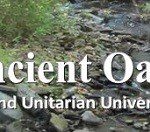“What now?”
I see this question asked with some regularity. What can I read beyond Wicca 101? Celebrating the Wheel of the Year is nice, but isn’t there more? How do I go deeper? The specific questions vary but the theme doesn’t: a seeker has found a Pagan or magical tradition, likes what he’s done so far, but doesn’t know quite where to go from here.
There are many different approaches toward what I call Intermediate Pagan Practice. This is what worked for me and for others who’ve followed it. It’s not the only way to move beyond beginnings, but if you’re wondering “what now?” it’s worth a try.
Commit to Daily Spiritual Practice. No matter what your specific religion, tradition, or path, there is no single thing you can do that will have a greater impact than committing to a spiritual practice every day. Prayer, meditation, walking, making offerings… the list of possibilities is long, and if you’re asking “now what?” you’re almost certainly doing one or more with at least some regularity. Now commit to do one of them every day. If this is your first time, pick the one you like the most. The discipline you develop with easy practices will carry over when you move to more difficult practices.
There is no shortcut, no substitute for doing the work of spiritual practice. The American Buddhist teacher Baker Roshi said “enlightenment is an accident, but practice makes us accident prone.” This is as true for Pagans – or anyone else – as it is for Buddhists.
 Get Out of the Bookstore. I love books, bookstores and libraries. I spend most of my waking hours at home surrounded by books, and it is rare for me to not be in the process of reading at least one. But at some point, Hermione Granger has to put down Hogwarts: A History and pick up her wand.
Get Out of the Bookstore. I love books, bookstores and libraries. I spend most of my waking hours at home surrounded by books, and it is rare for me to not be in the process of reading at least one. But at some point, Hermione Granger has to put down Hogwarts: A History and pick up her wand.
Write a ritual. Do a ritual. Visit a sacred site or a place of natural beauty (they’re frequently one and the same). Make offerings to your gods and goddesses. Work a spell. Plant a garden. Pick up trash. Unclutter your life. Move from passive learning to active learning.
You’re not going to stop reading, but if you’re moving to Intermediate Pagan Practice you’re going to need books that aren’t on the shelves at Barnes & Noble. Give thanks for used bookstores, for online booksellers who carry more items than any physical store possibly could, and for e-books and print on demand services that allow publication of books whose sales are so small no traditional publisher would ever touch them.
 Get Out of the House. We can debate whether or not Paganism is a nature religion, but in the words of the Reformed Druids of North America, “Nature is good. Likewise, Nature is good.” The modern Pagan movement is in large part a response to the excesses of the industrial world, which has isolated we human animals from our environment. We need to breathe fresh air, feel the Sun on our faces, howl at the Moon and hug the trees. For at least a few minutes every day, step away from the computer and go outside.
Get Out of the House. We can debate whether or not Paganism is a nature religion, but in the words of the Reformed Druids of North America, “Nature is good. Likewise, Nature is good.” The modern Pagan movement is in large part a response to the excesses of the industrial world, which has isolated we human animals from our environment. We need to breathe fresh air, feel the Sun on our faces, howl at the Moon and hug the trees. For at least a few minutes every day, step away from the computer and go outside.
As well as literally getting out of the house, get out figuratively. Go to Pagan Pride Day. Go to open rituals and public celebrations. Go to festivals and conferences. Go see what other Pagans are doing. Talk to people – find out what’s working for them and what’s causing them difficulties.
Becoming part of a CUUPS group was one of the two or three most important, most influential things I did as I moved from Beginner to Intermediate. The other Pagans in my group are my teachers, my students, and my friends. They encourage me to be the best I can be and they hold me accountable to do what I say I’m going to do. I would not be where I am without them.
Beyond that, there are things you can do in a group you simply can’t do on your own. A solitary procession is more of a walk. A solitary spiral dance can’t be done. I’ve spent plenty of time in solitary communion with gods and goddesses, but I could not have had an experience like the Morrigan Devotional Ritual on my own.
Look around for the right group. Christians are notorious for church-shopping – there’s no reason Pagans can’t coven-shop. If a group doesn’t seem like a good match for you, keep looking. There are no perfect groups, but your basic beliefs, practices, goals and expectations should be compatible with what a group is already doing.
Go Back to the Bookstore. Only this time stay away from the Pagan shelf. Pick up a book on Buddhism or Islam. Find the similarities with your own beliefs and practices, and see where you’re different. If you follow an ethnic-based tradition, read the history of those people. Read science. Remember: “Nature is good. Likewise, Nature is good.” Richard Dawkins is a lousy theologian but he’s an excellent biologist. The common origin of life on Earth is a very meaningful fact for Pagans… and for everyone else. The more you learn about our world, the better you can relate to it.
Serve. Why are we taking the time to learn all this stuff when we could be wasting our lives with the mindless distractions of television? We’re trying to learn and grow so we can make a difference – or a bigger difference – in the world. Put all that personal development and practical magic to good use. Volunteer at a retirement home or a soup kitchen. Pick up trash on the street. Serve on a committee – festivals and events don’t plan themselves. Do something tangible to make the world a better place for other people and other creatures.
That feeling of “what now?” is a good thing. It means your curiosity is engaged and your desire for something more is active. It means you’re motivated to step out of your comfort zone and try something new. It means you’ve already started Intermediate Pagan Practice.
There are other ways to move beyond beginnings – this is what worked for me. If something else worked for you, please share it with the rest of us.















